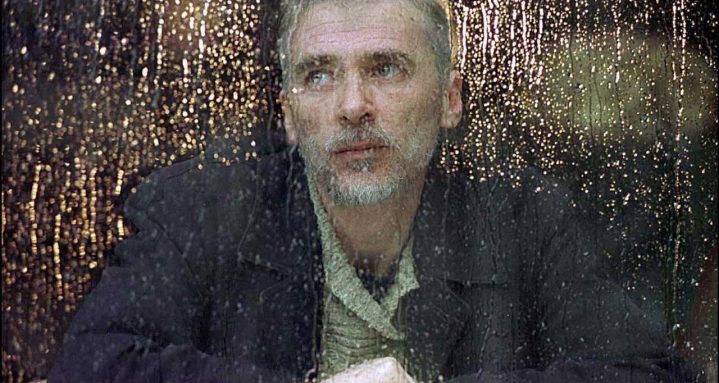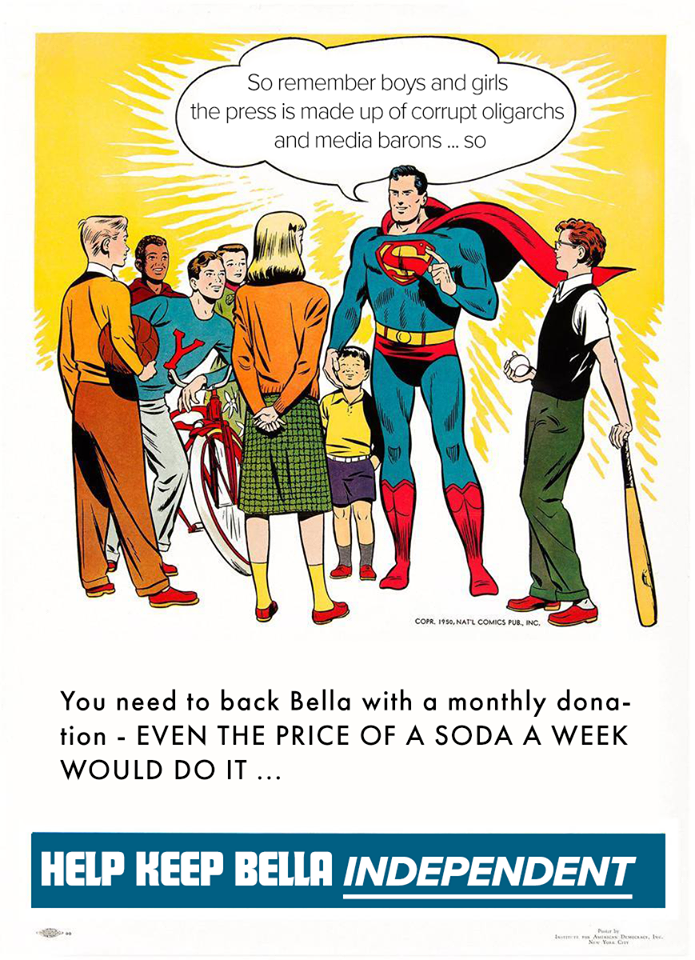Arrest this Moment
‘Bard o Vast Ingyne’
James Robertson on his new biography o Michael Marra, sang-scriever, musician and artist
I kent Michael Marra (1952-2012), as freen and neebor baith, for the last nine year o his life. I had kent his music for some while afore thon, but it wisna till I flitted tae Newtyle, ten mile north o Dundee, that I first met him. Michael and his wife Peggy had cried Newtyle their hame since the 1970s, and their bairns Alice and Matthew (noo 50% o the band The Hazey Janes) were brocht up there.
I had had ae previous contact wi ‘the Bard o Lochee’ in the mid-1990s, when I wis co-compilin a Dictionary of Scottish Quotations and scrievit a letter tae him spierin gin we could prent a hantle lines fae his lyrics (We could, I wis tellt, sae lang as we spelt them richt!) Amang the lines we wantit wis the chorus o ‘Hermless’ (fae his 1991 album On Stolen Stationery). Michael used tae pit this sang forrit as his candidate for Scotland’s national anthem (‘a very impertinent thing to do,’ he said, ‘especially in Dundee as we take a pride in our modesty’). Scunnered wi the militarism or vauntie claims o maist national sangs, Michael thocht that whit Scotland and mibbe the haill warld needit wis an anthem that wisna a threit tae onybody:
Hermless, hermless, there’s never nae bather fae me
I ging tae the libry, I tak oot a book
And then I go hame for my tea
When I wis daein the research for ma book aboot Michael, yin o the folk I interviewed wis a young musician cried James Kirkpatrick, an admirer o this sang because it ‘turns a word that could be construed as derogatory – “Och, him, he’s hermless” – into a positive attribute: this is someone who is incapable of doing you harm. I like that optimism mixed with averageness. And I love the idea of a whole country full of people who will do no harm.’
Michael Marra’s haill life and wark, it seems tae me, wis aboot daein nae herm. But mair nor that, it wis aboot seein the warld ootside in and tapsalteerie, or keekin at it fae ablow a stane, or through a windae that naebody else had jaloused wis even there. In sangs like ‘Frida Kahlo’s Visit to the Taybridge Bar’ (the Mexican painter is sent awa fae the steekit yetts o Heiven by Saint Peter, tae bide her time in yin o Dundee’s best-kent howffs) or ‘Reynard in Paradise’ (a tod sets up hame at Parkheid and learns tae see the beauty o men in the wey they play fitbaw – ‘a working model of the one big thing’) he gart ye see life fae an angle ye’d niver hae fund for yersel; but yince he’d gien ye that special ‘saicont sicht’ ye wid niver look at things the same wey again. His sangs celebrate the saul and smeddum o real, ordinary folk and shaw that their lives hae worth and grace. Whiles he could be fierce in attackin injustice and inhumanity – in a sang like ‘I am Shirley McKie’, for example – but whit is maist present in his wark is a belief in the pouer o kindness and luve.
Michael wis born intae a hoose whaur music o aw kinds wis aye bein played, sung and listened tae. He grew up in Lochee, a warkin-cless pairt o Dundee wi strang Irish links: the Marras, in spite o the Italian name, had ruits in Ireland on baith sides o the faimly. He had a shooglie journey through the education system – a trauchle for his teachers as weel’s himsel – that cam tae a sinderin o the weys when he wis fowerteen. Efter that, he tried a wheen o different joabs but nane o them for ower lang because his hert wis set on a career as a scriever o sangs. He wisna efter fame, as he aften said: whit he socht wis for his sangs tae be guid eneuch for ithers tae want tae sing them: ‘I didn’t want my name in lights, I wanted it in brackets.’
He played in the Dundee-based baunds Hen’s Teeth and Skeets Boliver, as weel as daein the roond o pubs and folk clubs by himsel, afore signin a recordin deal wi Polydor and heidin doon tae Lunnon. But Michael wis ower thrawn and kent his ain mind ower weel tae thole the fykie demands o the music industry: they wantit tae iron oot his runkles and his Scottishness and he wisna for gaun that road. In 1980 he pit oot a braw first album, The Midas Touch, but Polydor werena keen on hoo the nixt yin wis shapin up and it wis niver lowsed on vinyl (the tracks that should hae been on it did come oot in 2017 as Dubiety, a digital doon-load, as did maist o his back catalogue). Michael cam hame and set tae wark tae mak the records he wantit tae mak, in his ain wey.
The affcome, in 1984, wis Gaels Blue. This wis the moment, as I pit it in the book, when Michael ‘regains control and establishes, with astonishing confidence, his true voice not just as a songwriter but as prime interpreter of his own songs…It was also a statement of defiance…[and] an uncompromising commitment to working in Scotland.’ Sangs like ‘General Grant’s Visit to Dundee’, ‘Mincing wi’ Chairlhi’ and ‘Happed in Mist’ are baith local and universal in soond and sense. Karine Polwart, a fine sang-scriever hersel, tellt me that Michael’s wark gies the lee tae the notion that ‘to make a thing sing to someone else, to make it universal, you have to rob it of all its local colour and nuance and rhythm’. And it canna be threapit ower muckle that Michael, Dundonian tae his banes as he wis, wis naetheless an internationalist wha respectit aw cultures and aw communities. Gordon Maclean, artistic director o An Tobar in Mull, said o him, ‘Good music, he believed, like all good art came from everywhere and anywhere. There was not a drop of prejudice or racism in him.’
Five mair albums, three EPs and coontless musicals, revues, TV shows, plays and ither theatre pieces follaed. For mony years siller wis scant but Michael wisna in it for the siller, he wis in it for the wark, tae dae it as weel’s he could and bring oot the best in awbody he warked wi. He niver compromised his voice or principles or whit he had tae say. He wis at hame in English jist as he wis in Scots – and he could be gey sherp at pickin ye up if ye didna tak tent ower the wey ye used wurds. Tae him language, like music, wis baith a gowden gift and a precision tool. Yince, when he wis due tae play in Turin, he spiered an Italian neebor tae teach him hoo tae gie the introductions tae his sangs in Italian, syne delivered them like a native at the gig.
The sangs he wrote for plays like The Mill Lavvies are in a rich, reality-foondit Scots; when he collaboratit wi his pairtner-in-anarchy Saint Andrew on The Word on the Pavey, the wurds were mair surreal and whiles that funny ye were like tae burst yer sides lauchin. Ither sangs, like ‘Baps and Paste’ and ‘Muggie Sha’’ – ‘Now this song is in the full-strength language of Dundee,’ he yince said afore singin it tae an audience in Yorkshire, ‘so hopefully I will meet you at the end’ – are comic maisterpieces but aye retain their respect and empathy for the characters they’re aboot.
But Michael wis mair nor jist a sangwriter and musician. He wis a visual artist (the book is fou o examples o his drawins and paintins), an actor and producer, he wrote plays and stories, took photies – in fact, he wis an artist in awthin he did, and in ilka waukin meenit o his life (and nae doot in his dreams as weel). The 18th-century makar Allan Ramsay yince ruised Chaucer as a ‘Bard of vast Ingine’ and I doot the same phrase applies gey weel tae Michael.
Nae singil book is big eneuch tae haud the haill Michael Marra , or the mony Michaels. But, five year efter his daith, it’s possible tae begin tae see his life and art in perspective. I dinna doot that folk will aye be singin his sangs fifty, a hunner year syne, and mibbe mair. Jist as he wis, they are quality, and quality will aye oot.
Michael Marra: Arrest This Moment by James Robertson is published by Big Sky in paperback at £16.99 and hardback at £24.99. It can be ordered direct fae the publisher at http://www.bigsky.scot
See the book launch this Friday at Dundee Literary Festival.
*
If you enjoyed this article and want Bella to survive we need your support. A free Scotland needs an independent media, that can’t exist without your support. Please donate to our annual appeal here. Thanks.



Braw, informed, insightful and well-merited tribute to one of our finest.
Braw, informed, insightful and well-merited tribute to one of our finest.
And clearly a biography to get hold of.
What it it about Dundee? The water, the damp, the grey, grey skies…. Nope, that’s just too generic. There must be something we’re not seeing. First, the city delivers us William McGonagall, and then a century later, up pops, and now departs, the gloriously silly Michael Marra. If you ever wonder, why it is that other nations and peoples find us Scots a little heavy going, then you really don’t have to look beyond the trite blarney of this par of sages.
Serious, grown-up countries, of the kind that we used to be few centuries back, have grown-up artists producing grown-up culture. Burns and Walter Scott certainly have a lot to answer for alright. Turning a serious nation, known for it’s outstanding intellects, industry and ideas, into a homespun caricature of a place, with a self-pitying pseudo history as it’s central abiding narrative.
Thanks for this. One of my favourite songs by Michael Marra is The Flight of the Heron about the footballer Gilbert St. Elmo Heron, father of Gil Scott-Heron. A player for Celtic and father of a wonderful word master. I highly recommend Lesley Gordon Goffe’s book Gil Scott Heron a father and son story that has Michael’s lyric included.
“What it means when his name we hear
The hopes and dreams of every pioneer.”